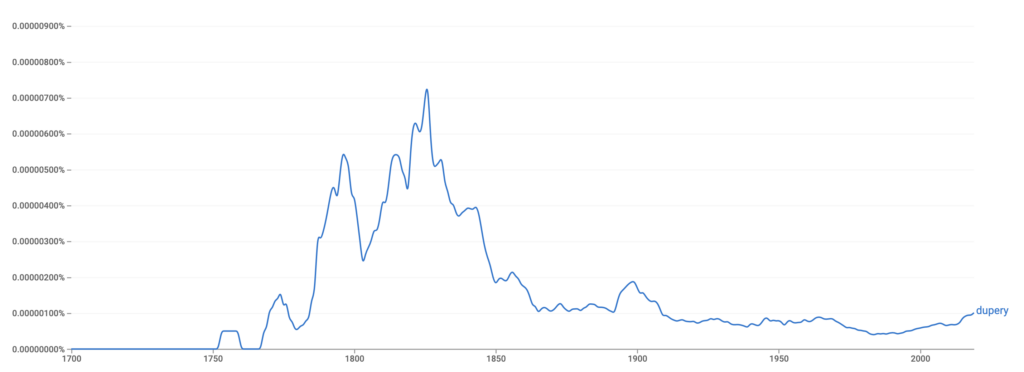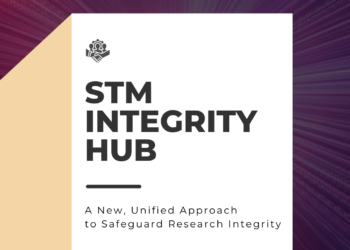Editor’s note: Today’s post is by Lisa Janicke Hinchliffe, Scholarly Kitchen Chef, and Leslie McIntosh, Founder and CEO of Ripeta.
Earlier this summer we found ourselves in the halls of Google X while attending SciFoo, plumbing the depths of online thesauri in search of a word that would encapsulate the deceitful and deceptive intentions of “fake science” and also deny such malinformation the privilege of being termed “science” at all. And, we found it. Dupery, the word is dupery.
‘Dupery’ as a word, peaked in written English in 1825 . Used primarily in relation to British council-members and by some philosophers, the word has since waned in popularity.

Recently, in 2013, “Oliver Plingeminckle” self-published a thriller entitled Dupery. As we can neither confirm nor deny the existence of “Oliver Plingeminckle” (though a Google search may suggest some algorithmic hints?), the name remains in quotes.
In more seriousness, the 2021 text The Epistemology of Deceit in a Postdigital Era: Dupery by Design, delves into this somewhat forgotten but useful concept: “This edited book collection offers strong theoretical and philosophical insight into how digital platforms and their constituent algorithms interact with belief systems to achieve deception, and how related vices such as lies, bullshit, misinformation, disinformation, and ignorance contribute to deception.”
And this is along the lines of our SciFoo discussion, which brought these ideas into the context of science and science communication. Science is being duped, and we are inadvertently playing a role in this scam.
Science Foo Camp, aka SciFoo, is an annual event organized by Digital Science with Google and O’Reilly held in Palo Alto, California. Invitees are drawn from a wide range of science fields as well as technologists and policymakers. The gathering is loosely structured, with the program emerging from the participants during the event itself, exploring areas of interest, enthusiasm, and intrigue. Amongst the truly international mix of attendees, there are always a handful of Digital Science folk, including some long-time SciFoo veterans and some joining for the first time. The conference’s “unconference” format means that there is no predefined agenda, all participants are equally welcome to propose sessions onsite and the primary constraint on topics discussed is attracting others to your suggested topics.
Naturally, though, the emergent sessions cover topics of interest and expertise of the attendees. During the event, we had the opportunity to facilitate tandem sessions on trust in science, scholarly integrity, and (the unfortunate) lack thereof. We each took the leadership role with one of the sessions and then respectively served as the other’s collaborator.
The first session of the two – “Taxonomy of Trust: How Do We Trust and Fortify Trust in Science” – was led by Leslie and framed through the lenses of how actors and their actions impact on trust. The conversation was broad and deep, starting with what is trust and then exploring trust in science, and finishing by identifying factors influencing trust in particular scientific works. Spirited debate about whether the scientific process itself was a source of trust and whether experts or novices use the same criteria for trusting led into a deep dive into the rigorous processes used to develop the The Intergovernmental Panel on Climate Change’s Special Report on the Ocean and Cryosphere in a Changing Climate that were intentionally designed to deepen trust in the findings and recommendations.
Unsurprisingly, the conversation also turned to distrust, its causes, and how to counter narratives that seek to discredit science. A particular challenge acknowledged was that some science is not of the highest quality (though it is science) whereas other work pretends to be science but is not. Ironically, this “fake science” may mimic high quality science so well that it can be harder for the fake to be identified than it is to identify that which is lower quality.
As the first discussion ended, we found ourselves in one of those quintessential hallway conversations that we relish, troubled by this issue of the fake. We began to ponder if the phrase “fake science” was inadvertently giving scientific credibility to works of fraud, lies, and deceit and making them seem like a subcategory of science rather than not science at all. And, in the spirit of SciFoo, we went to the proposal board and proposed a follow up session – “Is Fake Science, Science?”
The second session, led by Lisa, explored this question by asking participants in the session to share examples of known fraud in their fields and juxtaposing those with examples of poor quality work. Is fraud a subcategory of poor quality? Or, is it something different? The group came to relative consensus that there is a significant and important difference between scientific work that is poor quality, but still scientific, and work that has been made to appear as if it is scientific for deceitful and deceptive purposes. If we are to deny this later a place within the category of science, we need a term that does not present it as a kind of science, which “fake science” inadvertently does. We challenged the group for alternative terms and then shared our proposal – that we call this category of fictitious, ill intentioned, works, “dupery.”
Though we don’t necessarily expect to see the Google n-gram immediately reflect the level of usage in the early 1800s, the felicity of the term was immediately apparent. To be able to call something what it is, rather than as a fake of something else, is a bit of a relief. But, even more so, if we are invited to SciFoo next year, watch for a session in which we call out “The Duperies” – the most egregious and dangerous examples of the past year – and work together on plans to blunt their impact.
Discussion
3 Thoughts on "It Isn’t Fake Science, Because It Isn’t Science at All. It’s Dupery."
First off, I love the word dupery and will be adding it to be list of surprise Scrabble scores.
With that said, I’m hesitant to accept the idea that labeling outright fraud as “dupery” is desirable to avoid the term “fake science”. Fraud isn’t “fake science”, it’s “science faked”; a deliberate misrepresentation of the data, experimental procedures, and/or results to claim an advance based on falsification of the scientific record. In the world of hard science which I inhabit, that’s far worse than a creative interpretation which seeks to dupe someone into accepting a conclusion that is not supported by the evidence, and it deserves to be called what it is: fraud. Anything less is a euphemism that only serves to protect the fraudster’s reputation unjustly.
Interesting stuff Lisa. As you started to touch on at the end of your essay, there are at least several kinds of fakery that happen in science: the kind where scientists fudge their numbers (like p-hacking) or use fake data or images to support their conclusions; the kind where non-scientists publish work which can look to the public like science but is truly just a lot of rubbish (e.g., studies touting hydrochloroquine); and fakery where scientists for hire (and working well outside their area of expertise) discredit science by the IPCC and other bodies (see Naomi Oreskes’ “Merchants of Doubt” for a great exploration of this kind of fakery). These all involve dupery, but dupery of different kinds and for different ends. It’s a bit demoralizing to realize scientists are human and are not immune to the same biases and bad behaviors that affect everyone else. Maybe recognizing this happen makes it all the more important that we have effective gatekeeping mechanisms in science and not assume everything deserves to be read and publicized?
In common usage, to be duped usually suggests that one was deliberately, even maliciously, deceived. Dupery is a term that might be extended to humanistic fields as well, where we find “fake history.” Other popular terms are “pseudo-science” and “pseudo-history” though these don’t always imply intentional deception. Certain news organizations even manage to find scientists (perhaps speaking outside their research area) willing to publicly refute or “debunk” the essential facts of climate change, and specifically that global warming is human-caused.
These things are peripherally relevant to the writing of history when, for example, a medieval chronicle (thinking here about Sicily in the 11th century) mentions a large amount of snow in a mountainous area that now receives very little.



